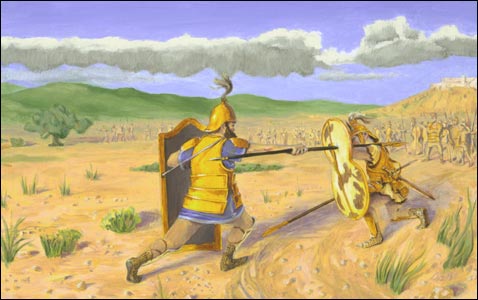|
|

|
|
|

|
|
|

|
|
|
|
Book Seven
|
|
|
|
The brothers — Hector and Paris — quickly turn the tide of battle in the Trojans' favor. So much so that Athena (a-THEE-nuh) starts to intervene. But Apollo (uh-POL-oh), staunch supporter of the Trojan cause, intercepts her and proposes that they end the general melee for the day by arranging a single combat between Hector and a Greek champion. Athena assents and plants the idea in the mind of Trojan prince Helenus (HEL-e-nus). As a seer, he is attuned to the will of the gods. Helenus advises Hector, who calls a truce and issues the challenge. At first no Greek accepts. Then Menelaus (meh-neh-LAY-us) steps forward, but he is quickly talked out of such a suicidal move.
|
|
|
|
Now Nestor (NESS-tor), oldest of the Greeks, begins a shaming harrangue of the troops by wishing he were young again, as when he alone, the very youngest of a force of warriors, dared face an Arcadian (ar-KAY-dee-an) champion who had decked himself out in the armor of a hulk called the Mace Man. This behemoth had gotten this name by disdaining sword and spear and going to battle wielding only a giant club of iron. The Mace Man had met his doom by trickery, surprised in a narrow pass where he couldn't swing his weapon. His armor was passed down to the Arcadian champion who, needless to say, was no match for Nestor.
|
|
|
|
The Greeks take Nestor's point and no fewer than eight warriors step forward to face Hector. Each scratches his mark on a stone, the stones are tossed in Agamemnon's (a-guh-MEM-nonz) helmet, and the lots are drawn. Great Ajax (AY-jax) is to be the Greek champion. A tremor passes through the Trojan ranks, and even Hector regrets his challenge. But there is no turning back now. Ajax makes a short, threatening speech and Hector responds in kind. It has been arranged that the winner claim's the loser's armor but that he relinquish his body so that it may be burned in the proper funeral rite.
|
|
|
|
With no further ado, Hector hurls his spear. The bronze point strikes the brazen outer surface of Ajax's shield and passes through five of its six layers of oxhide. In reply Ajax makes his cast and the spear passes straight through Hector's shield and breastplate and even the shirt beneath, but Hector dodges the point. Now each man dislodges his spear from the other's shield and makes a stab. Hector's spearpoint is bent back by the other's shield. Ajax thrusts through and draws blood from Hector's neck. Now Hector picks up a huge stone and hurls it against the shield of Ajax with a resounding clang. Ajax answers with an even bigger boulder that shatters Hector's shield and knocks him flat on his back. Apollo helps him to his feet.
|
|
|
|
And so it would have continued had not the heralds intervened. Parting the combattants, they urge a truce, since night is coming on. Ajax says he'll stop fighting if Hector calls the truce. Hector does so and offers an exchange of gifts to seal a pact of friendship. Hector withdraws unvanquished while Ajax returns to his men victorious.
|
|
|
|
That evening Nestor counsels Agamemnon and the Greek leaders to call a halt to the fighting in the morning so that the dead might be gathered up and burned in the proper manner. Then earth is to be heaped on the pyre to form a barrow. Near this Nestor proposes the erection of a defensive fortification for the Greek camp that runs all along the shore where the ships are drawn up, with gates for the chariots and a deep trench in front of it rimmed with sharpened stakes. Meanwhile Antenor (an-TEE-nor) is advising the Trojans to surrender Helen, for they have put themselves in the wrong by breaking the truce. But Paris refuses to give up his woman. Instead he proposes to return the treasures he has taken from her husband together with additional compensation. The herald Idaeus (eye-DEE-us) is dispatched with this offer, together with a proposal to clear the battlefield of its dead.
|
|
|
|
Idaeus delivers the message, adding on his own that he wishes Paris had drowned on the way home from Greece. At the strong urging of Diomedes (dy-uh-MEE-deez) the ransom is rejected, but both sides agree to the temporary truce. The dead are collected, washed clean of blood and gore, identified as well as possible, and wept over. A great pile of timbers is raised for the pyre. And once the rites are completed, the Greeks set about constructing their fort. When it is finished they feast, but no Greek dares drink his wine without first spilling onto the ground an offering to Zeus.
|
|
|
|
Notes:
|
|
|
|
Great Ajax — Great Ajax is the more formidable of the two Greeks named Ajax.
|
|
|
|
pyre — A pyre is a combustible heap of wood for burning a dead body as a funeral rite.
|
|
|
|
barrow — A barrow is a large mound of earth or stones over the remains of the dead.
|
|
|
|
breaking the truce — This is the original truce agreed upon by Hector and Menelaus and not the current one following the single combat.
|
|
|

|
|
|

|



